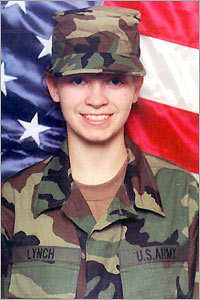"The whole aim of practical politics is to keep the populace alarmed (and hence clamorous to be led to safety) by menacing it with an endless series of hobgoblins, all of them imaginary." ~ H.L. Mencken
A Tale of Two Heroines: Rachel Corrie & Jessica Lynch
Life is a series of little deaths followed by a larger, final death. What we do in the interim, how we handle that portion of our adversity--those little deaths--determines how we handle that larger finality. Dignity and courage along the way makes the departure easier, as a few examples show.
A friend sent me a bookmark with this epitaph of Jackie Robinson:
"A life is not important except in the impact it has on other lives." A baseball fan and fellow artist, my friend Bob mostly takes his heroes from their ranks, fond of the Clemente Legacy and Roberto's philosophy: "Any time you have an opportunity to make things better and you don't, then you are wasting your time on this Earth." Clearly Rachel Corrie lived and died by that creed, as did Clemente, and likely Jessica Lynch believed strongly enough in a similar code that she took on the entire Pentagon.
Curiously, with so much heated debate recently over "The Passion," from millions of so-called Christians and Jews, one would suspect a great deal of interest and sympathy in an individual like Rachel Corrie, who was killed a year ago this March. The great teacher portrayed in Mel Gibson's bloody movie said: "No greater love has anyone, that they shall lay down their life for another." Somehow--lost perhaps in all that passion--was the simple yet powerful message of the courage an individual needs to love others while opposing a powerful state, whether a Biblical or modern state. To lay down your life for friends and strangers, as Jesus knew, required heroism more often than the misguided zeal wasted in the pursuit of "evildoers." Ironically, American Christians and mainstream Jews, and particularly the major US media, seemed to question the death of Rachel Corrie, suspicious of her intentions, almost perceiving her as an AGENT PROVOCATEUR in their eyes. Unlike her heroic contemporary, Jessica Lynch, no media-lauded book has yet been written about Rachel's heroism.
Pick and choose your battles wisely, or others will choose them for you. The state would prefer you let them choose those battles for you, even coming to your "rescue," as with Jessica Lynch, and using it for official propaganda. Rachel Corrie chose her own battle; Jessica Lynch had hers chosen for her. The parallel struggles of the two women, however, put them in the path of bullets and bulldozers, and the result was a series of little deaths, personal crucifixions. One will carry her scars for life, the other died from her wounds.
Killed on March 16, just days before the Iraq War began, Corrie tried to stop an American made bulldozer, driven by an Israeli soldier, from demolishing a Palestinian home. According to the United Nations Relief and Works Agency for Palestine Refugees, since the beginning of the current strife, 12,737 Palestinians have had their homes demolished. This is a policy of collective guilt and, not incidentally, also a war crime. Rachel's mother described what happened to her daughter.
"Initially, he [the IDF bulldozer operator] covered her in sand and other heavy debris. Then the bulldozer pushed Rachel to the ground and drove over her--then went into reverse to drive over her again. Rachel's arms, legs and skull were fractured. She died in an ambulance on the way to the hospital."
While crushed by the Israeli bulldozer operator, Corrie's true killer was the state, actually two allied states, who condoned her murder. Within weeks, while the war raged in Iraq, other International Solidarity Movement activists against the Occupation were targeted and killed. A few days after Rachel died for our sins, a memorial service for Corrie in Gaza was teargassed. Soldiers threw stun grenades and one activist noticed an extremely macabre appearance:
The memorial group, numbering about a hundred, had gathered to lay carnations and plant a tree when Israeli armored personnel carriers moved in. "They started firing tear gas and blowing smoke; then they fired sound grenades," said Joseph Smith of Missouri. Smith noticed the very same bulldozer that crushed Corrie pass in another convoy a little later, a blatant provocation or cruel irony. Months later, Israel would find the operator blameless and Washington would remain mute.
Courage in the face of the state takes on the image of a man on the cross but few Americans see the parallel, so distracted are they by cinematic or Catholic apparitions of Jesus, yet unable to see an example in reality. Corrie died for our sins. Before she died, she wrote: "I really can't believe that something like this can happen in the world without a bigger outcry about it. It really hurts me, again, like it has hurt me in the past, to witness how awful we can allow the world to be." Almost, faintly, one can hear the echoes of the tormented Jewish girl, Ann Frank, in her remarks. The words have an eerie similarity.
"I don't look at myself as a hero," said Jessica Lynch. "People would make up stories that they had no truth about." Lynch carries her wounds with the courage and composure lacking in the old men who conspired to send her into danger. Then too the buying and selling of PFC Jessica Lynch reveals a painful truth: Old men in high places will despoil the young, whether men or women, whether soldiers or civilians, as resources to be exploited. The most evident parallels between these two women then, aside from their gender and age, is that both were trampled by forces of the state, by certifiable war criminals if anyone dared to look that close, by old men lacking in the courage they both exhibited.
Unlike Rachel Corrie, who is dead, Lynch is a living national hero, although others may have acted far more heroically. Yet Lynch was the first to admit she did nothing heroic. Rachel Corrie would likely be among the first to defend the heroism of private Lynch, might disagree with this self-effacement by Lynch. Survival against cruel forces without becoming cruel yourself is heroic, an all too uncommon virtue. To survive without killing anyone else and your own spirit is a triumph, one evidently lacking in our world leaders, as they madly seek "terrorists" while seldom looking in the mirror.








 Reprint Rights
Reprint Rights